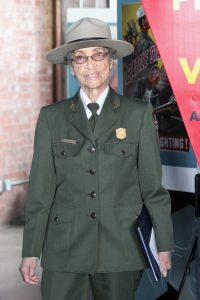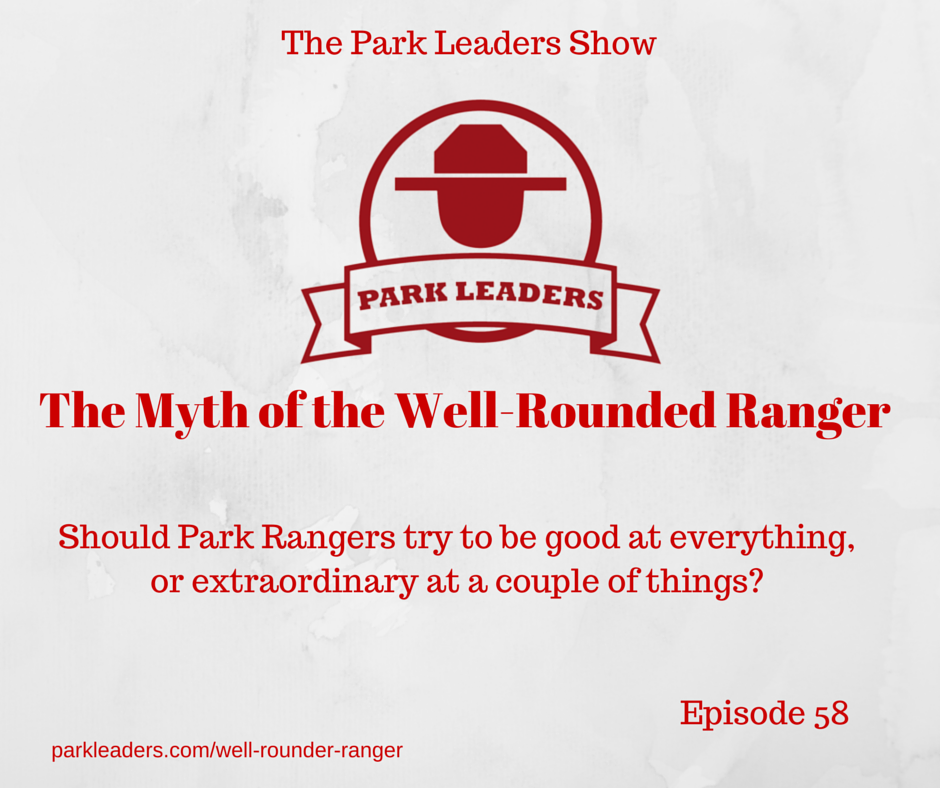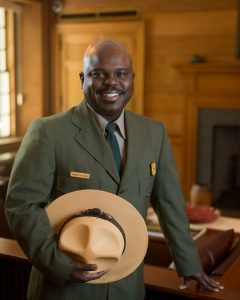Tue, 26 May 2015
This episode of the Park Leaders Show felt like I was talking to history. Betty Soskin is the oldest park ranger in the United States. Betty is 93 years old. Yes, that is impressive. But even more impressive is Betty did not become a park ranger until she was 85 years old. Talking with Betty, I got the feeling she did not necessarily become a park ranger, she became part of the narrative of Rosie the Riveter National Historic Park, and that involved wearing a park ranger uniform. "Whatever I do, they call rangering. But I would be doing it anyway because it is the only thing I know." Betty Soskin first collected national attention when she was furloughed during the government shutdown. When asked what the government should do to end the shutdown, Betty replied, "I am not wise enough to tell them what to do, except to get out of my way." The government shutdown was an obstacle to Betty's telling her story and getting important work done. Betty tackles each day with a sense of urgency rarely seen in people decades younger than her. Betty's story is an American story that can be told by no one else I have ever met. Her message, her life, and her contribution to the National Park Service is a story you don't want to miss. This episode goes much deeper than parks. We talk about history, wisdom, and diversity. 5.16.15 - Betty Reid Soskin interviewed on The Today Show (click to watch on YouTube) |
Tue, 19 May 2015
Lee Cockerell, former Executive Vice President of Operations for Walt Disney World, returns to the Park Leaders Show to talk about how parks can create magic. Previously, Lee has been on the Park Leaders Show to talk about what parks can learn from Disney and nine customer service rules. Since the last time Lee joined us, he has published a new podcast, Creating Disney Magic. Creating Disney Magic is a short, weekly podcast focused on leadership, management and customer service. You can find Creating Disney Magic on iTunes, Stitcher Radio, TuneIn Radio, Spreaker, or on Lee's Website. Lee also discussed his new book, Time Management Magic. This book will transform the way you approach time management and help you move from surviving to thriving. Lee also tells us how parks can create magic. He offers advice on how parks can communicate through the entire organization, focus on customers, and deliver a great experience for employees and visitors. Parks can get more done with a better attitude. Better productivity can equal getting 20% more staff in parks. Don't underestimate how much better you can be. You can create magic too. |
Tue, 12 May 2015
If focusing on service is what he meant, he was correct. But the concept of a well-rounded park ranger is hurting parks. Sure, there are people like Tom Betts at Bandelier National Monument who can do everything. Tom is true a well-rounded ranger. But I was not. And chances are that you are not either. And that is OK. It is a benefit to your park that you are not well rounded. Not being well rounded means you are strong in some areas that can be a tremendous help to your park. It also means you have weaknesses. There are some things you are not good at. That is OK. In fact, a good park manager knows how to consider the strengths and weaknesses to assemble a great team. Now, I expect park rangers to know enough to solve problems and get things done. But often, that does not mean the individual ranger needs to know how to do the actual work. The ranger needs to be able to recognize there is a problem and begin the process to solve the problem. The idea of a well-rounded ranger, taken too literal or too serious, creates an environment that focuses on weaknesses and hampers strengths. Let me give you an example. Auto maintenance is a weakness of mine. In fact, I have no interest in it at all. At one point in my career, I worked for a supervisor who felt park rangers who felt all rangers should complete the same tasks. Each ranger was responsible for doing the same tasks the same amount of times. This took people away from doing what they were strongest at to improve in areas where they were the weakest. I get the desire to have everyone on the team contribute to all areas of the operation, which would be why you may want well-rounded rangers. But it just doesn’t work. The well-rounded ranger concept forces everyone to spend an inappropriate amount of time improving their weaknesses. Great teams set people up to build on their strengths. Great leaders know this and assemble teams with strengths in mind. If taken too far, the well-rounded ranger concept is like having every member of a baseball team spend too innings at each position during a game. In that case, you get an outfielder spending time practicing to throw a fastball rather than perfecting his craft if catching fly balls. In the wonderful book Business Brilliant, author Lewis Schiff examines the traits of self-made millionaires. Lewis Schiff tells us – A Gallup poll found the 87% of working Americans felt that finding your weaknesses and fixing them is the best way to achieve outstanding performance. Sixty-one percent of workers say they need to focus on their weaknesses because that's where they feel they have the most room for growth. In follow-up interviews, they said that improving weak areas makes them feel more responsible more well-rounded and less vulnerable to embarrassment and risk of failure. They feel conscientious about working with their weaknesses, and hope that the practice will shield them from future reproach and failure. Meanwhile, self-made millionaires are spending each day avoiding their weaknesses in order to stay focused on their strengths where distinction, fulfillment, and profits are found. Hour by hour, day by day the workers from this survey protect themselves by becoming more well-rounded and ordinary while the millionaires enrich themselves by becoming more specialized and extraordinary. That information from Business Brilliant may work for a self-made millionaire, but you may be wondering how it applies to you and parks. Consider this. When you promote the strengths of your team, it allows you to fill holes on your team with someone who is strong in the areas you need the most. So a well-rounded ranger needs to be looked at in a different way. A well-rounded ranger is someone confident in her strengths. A well-rounded ranger can realize there is a problem and knows how to solve it, likely with the assistance of other people. A well-rounded ranger does not ignore things they do not like in favor of what they do like. A well-rounded ranger understands when and how to step up to help a teammate. But the well-rounded ranger, the ranger who can do everything, that well-rounded ranger is a myth. To me, it is a choice to be well-rounded and ordinary or specialized and extraordinary. What do you think of the concept of a well rounded ranger? |
Tue, 5 May 2015
Great Smoky Mountains National Park is the most popular National Park in the United States. People come from all over the eastern half of the country to visit the Smoky Mountains and drive visitation higher than park service icons such as Yellowstone or the Grand Canyon. The key to operating Great Smoky Mountains is not necessarily the visitors who come from other places, the key is connecting to the community.
The importance of connecting a park to the local community is exactly why Cassius Cash is the perfect fit for Park Superintendent. New to his role at Great Smoky Mountains, Cassius brings his concept of Listen - Learn - Build and is intent on connecting to the local community. Cassius come to Great Smoky Mountains from Boston, where he served as the Superintendent as Boston National Historic Park and Boston African American National Historic Site. In Boston, Cassius used stories to rebrand the park and built impactful connections in the community. Superintendent Cash also took a deeper look into the historic stories most people know to find additional stories that include more people. Finding more inclusive stories is a key to building more interest and support in our parks and Cassius Cash is a model of how to put those stories to work. Inclusive stories connect parks to people of different backgrounds, interests, and geographies. Superintendent Cash understands it does not matter if he is in an urban Boston park or park in the Appalachian mountains, connecting to the community and including everyone is the key to a thriving park. |
Park Leaders Show

Categories
generalPodcast
Archives
AprilMarch
February
December
November
October
September
August
July
June
May
April
March
February
December
November
October
September
August
July
June
May
April
March
February
November
October
September
August
July
June
May
April
March
February
January
December
November
October
September
August
July
June
May
April
March
December
November
October
August
July
May
April
March
February
January
December
November
October
September
August
July
June
May
April
March
February
January
December
November
October
September
August
July
June
May
April
March
January
December
November
October
September
August
July
June
May
April
February
January
December
November
October
September
August
July
June
May
April
March
February
January
December
November
October
September
August
July
June
May
April
| S | M | T | W | T | F | S |
|---|---|---|---|---|---|---|
| 1 | 2 | |||||
| 3 | 4 | 5 | 6 | 7 | 8 | 9 |
| 10 | 11 | 12 | 13 | 14 | 15 | 16 |
| 17 | 18 | 19 | 20 | 21 | 22 | 23 |
| 24 | 25 | 26 | 27 | 28 | 29 | 30 |
| 31 | ||||||
Syndication




